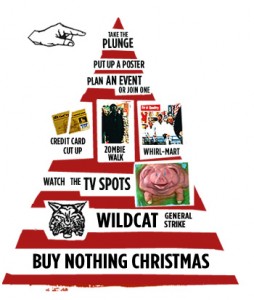 For the first time in my life, I had a non-Christmas on December 25th. No tree, no gifts, no cards. I wish I could say this was motivated by a noble, conscientious objection to commercialism, but really, it was just a combination of pregnancy-related austerity measures (i.e., saving money for the Blessed Event) and plain old bodily fatigue (I can’t bend over to tie my shoes, so there was no way I could wrangle a Christmas tree into a tiny top-floor apartment).
For the first time in my life, I had a non-Christmas on December 25th. No tree, no gifts, no cards. I wish I could say this was motivated by a noble, conscientious objection to commercialism, but really, it was just a combination of pregnancy-related austerity measures (i.e., saving money for the Blessed Event) and plain old bodily fatigue (I can’t bend over to tie my shoes, so there was no way I could wrangle a Christmas tree into a tiny top-floor apartment).
Little did I know I was joining a movement of sorts. I mean, I’m familiar with projects like AdBusters’ “Buy Nothing Day,” and “Buy Nothing Christmas,” whose creators have done a genius parody of the commercial nexus with their Buy Nothing Catalog.  And I’ve heard of people spending the day doing volunteer work, giving charitable donations in the name of a person for whom they’d ordinarily buy a gift, or making homemade gifts and cards for one another.
And I’ve heard of people spending the day doing volunteer work, giving charitable donations in the name of a person for whom they’d ordinarily buy a gift, or making homemade gifts and cards for one another.
But no gifts at all? Not even the homemade kind? That’s practically a breaching experiment–a deliberate violation of social norms. As Barry Schwartz put it in his 1967 classic article, “The Social Psychology of the Gift,” gift-giving is a key mechanism of social control–a form of exchange crucial to maintaining social structure across all kinds of settings, from contemporary North America to the ancient cultures of Papua New Guinea and the Trobriand Islands.
One reason gifts are so fraught with social tension is that giving and receiving them inevitably tangles us in a web of signs and symbols–particularly those related to identity. To quote from Schwartz,
Gifts are one of the ways in which the pictures that others have of us in their minds are transmitted (1967: 1).
And vice-versa: when we give gifts to others, we signal something about how we see them. The potential for hurt feelings is virtually limitless, which is one reason for the proliferation of websites devoted to the theme “Worst Gifts Ever.”
So for some people, opting out of gift-giving can bring blessed relief from this social challenge. But another challenge remains: how to fill the gap left by eschewing the ritual exchange?
After Googling “Christmas without gifts,” I was surprised to find a remarkable diversity of ideas for gift-free celebrations. They were not just clever, but also sweet and appealing (to me, at least). Here are two of my favorites:
1. Random acts of kindness toward strangers–aka, “Christmas spirit” (from someone’s “43 Things” page):
“On Christmas day, we go to Waffle House and eat breakfast and we leave her [the waitress, presumably: Ed.] a $100 tip.
Obviously, not everyone will have the wherewithal to leave a $100 tip. I certainly don’t. But even when I can’t leave a big tip, I’ve sometimes written thank you notes to wait staff on the back of my bill; at one of my favorite restaurants, I regularly wrote my thank yous in haiku form, which became a source of amusement for the whole staff (laughing at me or with me, it didn’t much matter).
2. Traditions that involve doing seasonally-specific stuff with loved ones, without spending anything:
“My personal best Christmas memories involve family Christmas traditions like looking for the Star of Bethlehem on Christmas eve, and making Christmas wishes in the starlight. Others go caroling, some build snowmen.”
To these terrific ideas I can only add The Gift of Sloth. Meaning: a vacation from doing anything you dislike.

Hate making the bed? Skip it! You can give the same “gift” to your loved ones: if it’s someone’s regular household chore to wash the dishes, they get the day off. Woohoo! Merry Slothmas!
Note: This is ideal for that hard-to-buy-for-person-who-already-has-everything. Instead of giving them more stuff, take some away!
Now what about you? If you’ve celebrated Christmas–or some other traditionally gift-focused holiday–without presents, what was it like? What did you do instead of exchanging gifts?
Comments 4
Tiago — December 28, 2009
Love that gift of sloth :D
Much better than giving or receiving gifts on Christmas just for the sake of it. Giving material gifts is too over-rated. People rather buy something useless just to get their conscience clear, instead of doing something that truly makes them (and others) happy. Kind of sad really.
Christmas is strangled with material values, everyone gets too anxious to buy stuff just for the sake of it. We should stop and think if we really need to buy stuff just to get a clear conscience: seems kind of selfish from everyone.
Tina — December 29, 2009
Merry Non-Christmas :)
Roshni Muralidharan — January 25, 2010
I definitely think that Christmas is one of those holidays that is contagious. The spirit of Christmas is something that is very strong so it affects people that don't even celebrate Christmas. For example in my family we don't celebrate Christmas but when other people give us Christmas gifts we then feel obliged to return the gift. So in a way we end up celebrating Christmas even though it isn't a holiday of our religion. In this situation gift-giving definitely becomes something surrounded by social tension.
I think the idea of "Christmas without gifts" is something that should be more widely embraced because gift-giving in general is a social norm in America that defintely causes alot of tension. If someone gives everyone in a group a gift and then excludes one person, that one person probably will end up feeling terrible. Removing the social norm of gift-giving completely from Christmas will allow the holiday to be celebrated for what it really is about.
Regan — January 27, 2010
I find it sad that people do feel obligated to give gifts to others for no other reason than that it is expected of them. It takes the meaning out of a gift, which is suppose to be a kind gesture to some one we like and appreciate. I think gift giving should be from the heart, not because of social obligation. However, I don't believe that people should stop giving gifts all together since it is part of the tradition of the holidays. I think we should reconsider who we give gifts too and for what reasons. As I said earlier, gift giving should be thoughtful, meaningful, and from the heart.